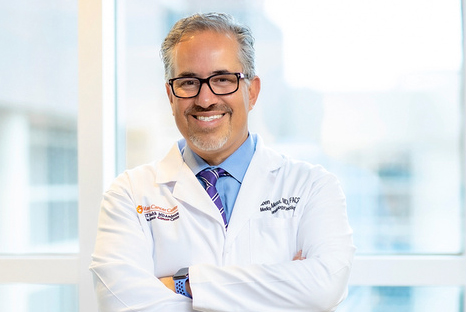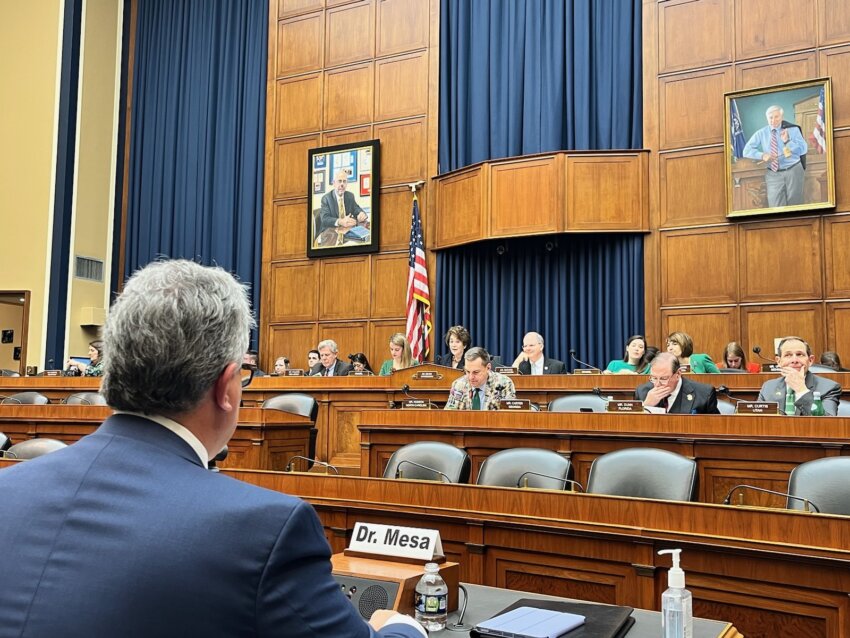Contact: Will Sansom, (210) 567-2579, sansom@uthscsa.edu
SAN ANTONIO (March 18, 2022) — Ruben A. Mesa, MD, FACP, professor of medicine and executive director of the Mays Cancer Center, home to UT Health San Antonio MD Anderson Cancer Center, testified on clinical trial diversity yesterday (March 17, 2022) before the House Committee on Energy and Commerce. The hearing was titled “The Future of Medicine: Legislation to Encourage Innovation and Improve Oversight.”

Dr. Mesa spoke in the John D. Dingell Room of the Rayburn House Office Building in Washington, D.C. “So deeply honored to have testified @EnergyCommerce committee of the US Congress on improving diversity in cancer clinical trials,” Dr. Mesa tweeted, including addresses @AACI_Cancer, @AACR, @UTHealthSAMDA and @ASH_hematology.
“Cancer is a thief that steals from cancer patients and their loved ones both length of life and quality of life,” Dr. Mesa said in beginning his written remarks. “Indeed, cancer steals cherished memories not yet made. I am the son of a father lost to lung cancer, the son of a breast cancer survivor, and I have dedicated my life’s work to changing the devastating effects of cancer.”
The Mays Cancer Center is the only National Cancer Institute-Designated Cancer Center in Central and South Texas. The region is home to a predominately Hispanic population, many members of whom are medically underserved. Dr. Mesa spoke about a Mays Cancer Center program that is increasing minority participation in clinical trials.
“We mandated that each new trial at the Mays Cancer Center put in place a Minority Accrual Plan that includes enrollment projections and a demographic-specific toolbox with strategies for clinical investigators to pull from to promote enrollment,” Dr. Mesa testified. “Since its inception in 2013, this planning process has helped at least 50 clinical trials per year with the goal of improving enrollment. Prior to its implementation, the enrollment of Hispanics into our interventional studies was 46 percent; now it is 56 percent.”
Dr. Mesa, an investigator on more than 100 clinical trials so far in his career, was asked about standards for ensuring diversity. “As we think about the barriers patient can face in entering clinical trials, there is not a single solution,” he said. “Patients have different complexities and different barriers. There are the personal aspects, such as lack of health literacy, preconceived notions about clinical trials and transportation limitations, and then there is the conduct of the trials themselves. How is a trial designed? What are its eligibility criteria? Certain boilerplate criteria used in trials can be discriminatory.”
In answer to a question about the Mays Cancer Center’s Minority Accrual Plan, Dr. Mesa used the example of multiple myeloma, a disease that is overrepresented in Black Americans. Trials for this cancer specifically included outreach to predominately Black churches and other groups in South Texas to increase awareness and decrease barriers, he said.
Dr. Mesa also answered a question about “decentralized” trials that involve more collaborators. “Decentralization really is critical,” he said. “It helps facilitate community partnership, a network. It also encourages telehealth solutions, beginning with initial screening for clinical trials. How are telehealth solutions, as a critical planning piece, built into trials to make them the most feasible for participation?”
Dr. Mesa said that in his years of experience as a physician researcher, he has seen firsthand the tremendous value of improving the diversity of the patients participating in clinical trials. “Breaking down barriers to clinical trial participation not only promotes health justice: It’s good science,” Dr. Mesa said.
Concluding his written remarks, Dr. Mesa summed up the challenge and importance of fostering diversity in cancer clinical trials.
“Of course, there is no silver bullet for fixing the current lack of diversity in clinical trials,” he said. “No single piece of legislation can finish the job and allow us to turn to other work. This effort will take sustained attention and a willingness to act intentionally. But the results will be life-changing: Improved outcomes for patients. More and better therapies proven to be safe and effective. More years for patients to be with their families, living full and healthy lives.
“You can take real and meaningful steps today toward that future, and I hope you will,” he said in his call to action.
The University of Texas Health Science Center at San Antonio, also referred to as UT Health San Antonio, is one of the country’s leading health sciences universities and is designated as a Hispanic-Serving Institution by the U.S. Department of Education. With missions of teaching, research, patient care and community engagement, its schools of medicine, nursing, dentistry, health professions and graduate biomedical sciences have graduated 39,700 alumni who are leading change, advancing their fields, and renewing hope for patients and their families throughout South Texas and the world. To learn about the many ways “We make lives better®,” visit www.uthscsa.edu.
The Mays Cancer Center, home to UT Health San Antonio MD Anderson Cancer Center, is one of only four National Cancer Institute-designated Cancer Centers in Texas. The Mays Cancer Center provides leading-edge cancer care, propels innovative cancer research and educates the next generation of leaders to end cancer in South Texas. Visit www.UTHealthsaMDAnderson.org.
Stay connected with The University of Texas Health Science Center at San Antonio on Facebook, Twitter, LinkedIn, Instagram and YouTube.


